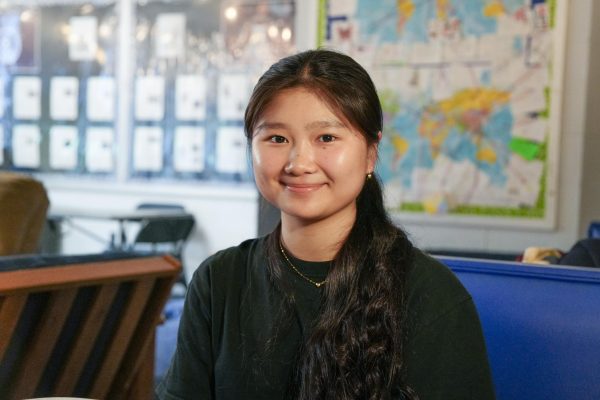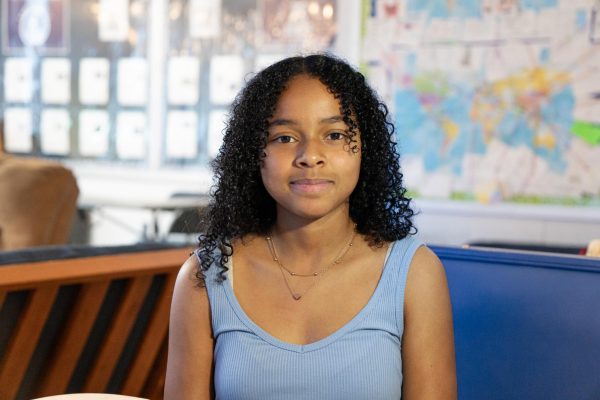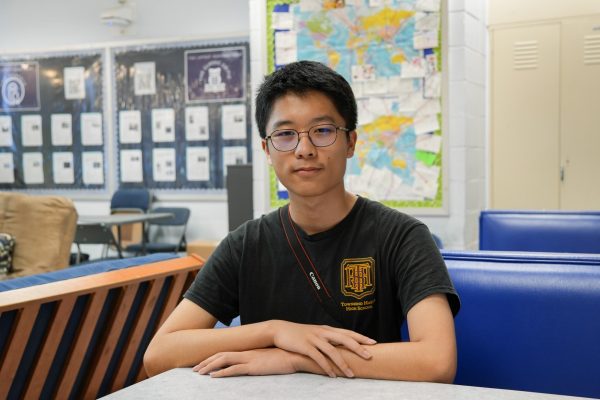
On April 21, Chancellor Melissa Aviles-Ramos toured Townsend Harris High School, observing three courses that showcase the school’s early college program through Queens College. After the classroom visits, she met with a group of school administrators, teachers, parents, and local politicians who discussed the impact of the program and the financial support the school needs to sustain it.
Assistant Principal of English Ryan Dunbar and Assistant Principal of Guidance Jessica Graf organized the schedule for the visit.
“The visit was constructed to allow her to witness the growth that our students have in the humanities directly as a result of our partnership with Queens College,” said Mr. Dunbar.
In 2020, New York City Public Schools cut funding for the partnership, citing “a severe budget crisis caused by the COVID-19 pandemic.” In the five school years since then, THHS has continued to run the program, which ensures all seniors earn twelve college credits through courses taken at Queens College. The credits have remained free to students through various funding sources. Often, that funding has come from allocations from the state budget secured by local politicians. At the meeting held after the tour, which members of The Classic attended, Principal Brian Condon indicated that, despite these allocations, the future of the program was uncertain without additional financial support from the city. He said that, while he was actively exploring ways to reduce costs with Queens College, the school continues to need financial support to offer all students this experience.
State senator John Liu and Assemblywoman Nily Rozic both joined the chancellor for the visit. Afterwards, Senator Liu published a press release saying that he and Assemblywoman Rozicjoined the visit to “call for the continued funding of the school’s exceptional early college credit Bridge Program.”
Senator Liu, Assemblywoman Rozic and Mr. Condon all commented on the partnership in the press release.
“It’s unacceptable that such an impactful program that prioritizes excellence and equity has been left to scramble for funding year after year,” said Senator Liu.
Assemblywoman Nily Rozic, an alumna of the school, said “its early college Bridge Program is a testament to what’s possible when we invest in our students’ futures.”
Mr. Condon said that THHS can provide “a model for all early college programs in the city.” Mr. Condon indicated that he wanted his school to be a resource for other schools seeking out similar partnerships for early college education, and the press release indicated that Senator Liu and Assemblywoman Rozic “are pushing to include additional funding in the state budget to sustain the popular program and expand the model citywide.”
The visit began with a group of students welcoming the Chancellor in the lobby with a showcase of various programs the school has to offer. The advanced modern band class played music while the Chancellor saw a variety of displays, including a series produced by the school’s Writers Academy extracurriculars: The Classic, The Starling Press, the Nightingale Theatre company, and The Phoenix.
Some of these programs run through funding support from the QC partnership. The Chancellor then visited a writing process class, an AP research class, and a QC senior humanities seminar class. According to Mr. Dunbar, these three classes model how the school supports students’ academic progression from freshman English classes, to college-level research opportunities at THHS, to the actual college seminar course all THHS seniors take at QC.
In the meeting with the chancellor afterwards, Mr. Condon indicated that the school is having trouble continuing to find funding to support the program as is. He suggested a number of options for maintaining it without a restoration of funding from the city, including a ‘last resort’ suggestion that students might have to pay for some college credits at Queens College (which would cost hundreds of dollars per student).
In interviews with a range of students, The Classic asked how students would react to potential changes to the program outlined at the meeting, including the possibility of students and families themselves taking on part of the financial burden. While some students said they would be willing to pay for these classes, not all students said they would be able to afford the cost.
Junior Heidy Estrada said, “I think that’s just unfair and unjust, because again, a lot of people who go here are not in the financial situation to be able to pay for these classes. And in that they will be losing so many opportunities.”
Senior Tony Jia said, “If the program got more funding, I think it could be expanded by letting students start earlier…. If we could build this into the curriculum earlier, I honestly believe Townsend students would be unmatched.”
Current seniors at Townsend Harris highlighted the significant impact of the QC Bridge Program.
Beyond academic credit, the program has proven crucial in helping students explore their interests and gain clarity about their future career paths.
All seniors take two humanities seminar courses, which are co-taught by THHS teachers and QC professors. They also take two QC elective courses that they choose and are taught by QC professors. The courses are not special sections for THHS students. They are actual QC classes that seniors take alongside QC students.
Senior Sithi Das took a sociology course as her elective this year. She said, “I think because I took sociology and realized how helpful it was, it made me solidify my desire to go into healthcare.”
Alumna Kelly Gildea graduated from Townsend Harris in 2024 and now attends Harvard University.
“Students would be losing out on valuable educational opportunities if the QC program was cut,” Kelly said. “I would have entered my freshman year of college without a clear idea of what I wanted to study, very little understanding of what college classes were like, and much less confidence in my ability to succeed in college programming if it hadn’t been for the QC Bridge program.”
Dr. Sean Nolan, an English teacher at THHS who co-teaches one of the QC seminar, said he sees the program as a natural culmination to the school’s mission to foster intellectually curious students: “I think it’s a capstone to what they’ve been working hard on for the last four years. And when students come into class thinking about it that way, I think it opens a lot of doors for them to bring in knowledge that they have, not just from their English class, but also from the wide variety of courses that they’ve been exposed to.”
“I think that philosophically, an early college experience is part of our identity,” Mr. Dunbar said. In addition to being the English department assistant principal, he also teaches two QC seminar courses. “But physically, we are part of the Queens College Campus, and we’re really proud of our presence here. So this partnership is kind of built into our DNA in a lot of ways.”
“[The program] is going to increase the possibility of a thriving adulthood for students,” Dr. Nolan said.
In her newsletter, Assemblywoman Rozic discussed her visit and the program. “Students not only earn college credit, but also gain firsthand experience with campus life, independence, and navigating a college environment,” she said.
Though the future of the Queens College Bridge Program remains uncertain due to funding concerns, school leaders, elected officials, and community members continue to advocate for sustained funding, hoping to preserve equal access for all students at the school.
“In our school, our philosophy is that anybody who comes through these doors is worthy of [these programs], and it’s our job to get them ready for that experience,” Mr. Dunbar said.
































Sham • Jul 15, 2025 at 1:52 am
this is such a departure from THHS’ historical partnerships with CUNYs! I know this is a developing story, so would love to hear more details on the decision here:
– St. John’s is a good choice, and I wonder how/ if credits from SJU will transfer to other CUNYs/ SUNYs and schools. I also particularly appreciate their vested interest in THHS students matriculating with them, offering the scholarship and everything.
– what is the current/ historical matriculation rate of students at SJU? I feel like it’s usually a popular choice for pharmacy and that’s about it- and the pharmacy program has gotten longer and longer there.
– I wonder why QC/ CUNY didn’t support funding on their own part- is this not a mutually beneficial relationship for them? are they short on funding themselves?
– what is the matriculation rate of THHS students at QC/ CUNYs (the distinction here between matriculation at QC particularly vs other CUNYs might be the kicker)
– I don’t imagine admin didn’t look into College Now – would love to hear more about why that isn’t an option, since it’s literally the same program for free available to all NYC HS students after application
– Taking away the college campus experience is so disappointing; it was one of the major draws to this program! Will students still at least be able to enroll in SJU classes the way they were QC classes? Class selection and the portal experience is such a quintessential college experience, and I was so glad to have gone through that before entering college myself.